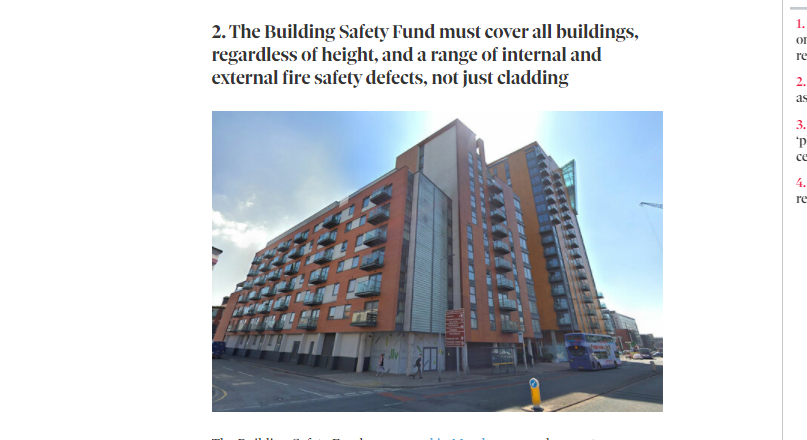The gov looks set to announce its next plan to fix the cladding scandal. Looks like we could see funding increased to £5bn, with a £2bn levy on developers. Reported it will only be for removing cladding on buildings >18m.
Some quick reflections from me https://www.insidehousing.co.uk/news/jenrick-poised-to-unveil-further-cladding-crisis-funding-69482
https://www.insidehousing.co.uk/news/jenrick-poised-to-unveil-further-cladding-crisis-funding-69482
Some quick reflections from me
 https://www.insidehousing.co.uk/news/jenrick-poised-to-unveil-further-cladding-crisis-funding-69482
https://www.insidehousing.co.uk/news/jenrick-poised-to-unveil-further-cladding-crisis-funding-69482
Firstly, is a step in the right direction and testament to the work by groups like @UKCAG and @MCRcladiators. Two years ago, consisted of a handful of l’holders in ACM blocks and gov had given no money to private blocks. It is now a national movement. https://www.theguardian.com/society/2019/mar/10/private-flat-owners-start-campaign-over-grenfell-style-cladding
The £5bn will help out a lot more leaseholders but will not get anywhere near the £15bn that it has been estimated fixing the building safety crisis will cost. There will be those that miss out. Once again, we could be looking at another ‘cladding lottery’ https://www.insidehousing.co.uk/news/news/leaseholders-warn-against-cladding-lottery-after-government-announces-fund-61351
Does not mark a quick solution. Fund still needs to be opened, applications made and the work needs to be carried out. This is going to take years, and people will still be trapped, likely unable to sell their homes, and paying for WW and insurance hikes for a while yet.
This is not a cladding scandal, this is a building safety crisis. Focusing money solely on removing cladding fixes half the problem. There are examples where people are facing huge bills and there cladding is completely fine. These guys  will miss out https://www.insidehousing.co.uk/news/news/leaseholders-facing-100000-remediation-bills-despite-compliant-cladding-68765
will miss out https://www.insidehousing.co.uk/news/news/leaseholders-facing-100000-remediation-bills-despite-compliant-cladding-68765
 will miss out https://www.insidehousing.co.uk/news/news/leaseholders-facing-100000-remediation-bills-despite-compliant-cladding-68765
will miss out https://www.insidehousing.co.uk/news/news/leaseholders-facing-100000-remediation-bills-despite-compliant-cladding-68765
Any money that doesn't address defects such as defective or missing firestopping, is inadequate. Ask any leaseholder that has had their building checked recently and they will tell you firestopping was identified as an issue. This is almost as big a problem as cladding.
Fixing cladding could inextricably speed up the bills l'holders for other fire safety defects. Have seen cases where those who have received funding for removing ACM have expedited the bills for non-ACM remedial works due to the building owner wanting to do them at the same time.
Further to this point. Gov needs to confirm that leaseholders who have already paid for or contributed to fire safety bills, be recompensed. In the case of the some ACM blocks, l'holders paid bills well before funding came and they were paid back. https://www.insidehousing.co.uk/news/news/leaseholders-in-london-block-pay-nearly-35m-for-grenfell-style-cladding-removal-61262
New fund won’t help buildings <18m. Since fateful day gov published its consolidated advice last Jan saying dangerous materials should be removed from buildings regardless of height, 1000s more buildings brought into scope. Most leaseholders I speak to live in buildings <18m.
To understand how significant this is, I will break down. There are an estimated 10,000 buildings >18m in England. In comparison, there are £100,000 blocks between >11m https://www.insidehousing.co.uk/news/news/more-than-100000-medium-rise-buildings-outside-scope-of-fire-safety-measures-minutes-reveal-64231
Money doesn’t solve unsellable homes problem. Tricky to overcome. Until remedial works are completed, would imagine risk averse banks' position will remain. Does gov need to push banks to provide mortgages for buildings where remedial works are scheduled? Needs to be looked at
Buildings insurance has skyrocketed. In some cases by > 1000%. Can’t see money fixing that issue for a while. Fallout of Grenfell has had impact on way insurance market is towards high rise buildings and while £5bn might help, high bills here to stay. https://www.insidehousing.co.uk/news/news/birmingham-high-rise-with-fire-safety-issues-faces-1237-insurance-premium-hike-66215
Supply chain is important. This includes those inspecting blocks, those designing works and contractors doing the work. Scale of work is huge and organisation is needed to carry out efficiently and economically. Supply and demand disparity is driving up costs for work.
And then there is the issue around professional indemnity insurance for building safety inspectors and contractors. The huge PI bills for these companies is making it a harder environment to operate in and putting even more pressure on supply.

 Read on Twitter
Read on Twitter



